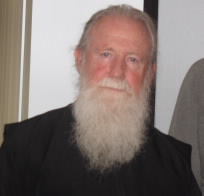People ought to do what is good for them. But, immediate concerns often overwhelm even the most noble life-plans. A stable religious life can fall apart under stress, including economic stress. We at Pravmir have asked clergy, as role models of the church, how they themselves have maintained their spiritual lives during hard economic times, and what advice they can give for the faithful now at this time of economic crisis.
 Fr. Sergei Sveshnikov, rector of the Holy New Martyrs and Confessors of Russian church in Mulino, Oregon — the first in the world to be consecrated in memory of the holy new Russian martyrs (1983).
Fr. Sergei Sveshnikov, rector of the Holy New Martyrs and Confessors of Russian church in Mulino, Oregon — the first in the world to be consecrated in memory of the holy new Russian martyrs (1983).
When it comes to the economy, the life of a priest is not much different from that of the life of any other person: I have to buy gasoline for my car, food for my children, and make mortgage payments. Additionally, larger parishes may employ full-time clergy, but in smaller parishes priests often have to have secular jobs, which makes them vulnerable to the ills of the job market: salary freezes, pay cuts, layoffs, etc. Of course, it is very difficult to be a father of a large Christian family and to attend to the needs of parishioners, when there is turmoil in the priest’s life.
The most difficult situation, however, is when the parish is struggling to raise enough money to keep the doors of the church open. In bad economic times, fewer people can make large donations, and more people need the help of the church, so, as supply and demand go, there a greater financial demand on the parish and a much smaller supply of funds. When the parish is “in the red,” it is always very difficult on the people who care the most about the church.
The best advice that I can give is for the parish to come ever closer together, especially when the times are difficult. We are not a club, we are the Body of Christ, and when one member of the Body is suffering, the whole Body is in pain. Those who do not feel this pain, should ask themselves whether they are still living members of the Body. If we come together and actively seek to show the love of Christ to each other, then we will make sure that our churches are not in debt, and that not a single one of our brothers and sisters in Christ goes hungry, loses a home, or cannot come to church because he or she cannot afford the gasoline.
 Father Geoffrey Korz, priest of All Saints of North America Orthodox Church, Hamilton, Ontario, Canada.
Father Geoffrey Korz, priest of All Saints of North America Orthodox Church, Hamilton, Ontario, Canada.
Recession Woes & Spiritual Work: Is There a Balance for Clergy?
Many years ago, a friend said to me, “I believe in God, and I’m faithful, but I really think there has to be a balance on all these spiritual things,”.
“A balance between Christ and… what?” I asked, as gently as I could.
“Uh… you’ve got me there,” came the reply.
For Orthodox Christians in general there is no “balance” to be found in the midst of any hardship, financial, personal, or medical. Our only path in a crisis (indeed, our only path in life) must be to heed the words of scripture that urge us to draw near to Christ, that He would draw near to us.
Orthodox Christians must get committed: firstly to Christ and His Church, secondly to their families and those close to them, thirdly to the care of those in need, and only fourthly to their jobs. Practically speaking, this does not necessarily mean cutting back on our time at work, if financial need necessitates it. It does mean making daily prayer, and regular Confession and Communion non-negotiable features in our life.
For clergy, as much as for any Orthodox Christian, it is the spiritually constructive cultivation of time outside formal working hours which will make us or break us. We might ask ourselves a few questions:
– Do I have several spiritually solid Orthodox people with whom I can speak, and from whom I can seek help and advice?
– Do I have regular contact with my spiritual father or confessor?
– Do I redeem my “entertainment time” with spiritually redeeming things, or is it time wasted on things which will make it emotionally and spiritually more difficult for me to be of help to my family, friends, and brothers and sisters in Christ?
– Do I make the best use of vacation and travel time, and make sure to include church stops, and pilgrimage to holy places, on my itinerary?
– Does my family have a normal and healthy eating routine, striving to keep the fasts for their full spiritual and physical benefit?
What might one do concretely? From real-life examples, one might consider the following:
– Maximize your long distance telephone plan. Call Orthodox friends, or make inquiries from others within the Church, in order to bring the circle of faithful closer together.
– Be part of some type of spiritual talks: a clergy-led book study at home or in a parish, a regular lecture series with a variety of solid Orthodox speakers, an Orthodox Bible study, an OCF, etc. One might swap recordings of Orthodox talks, or Orthodox videos and films, and discuss the important spiritual lessons they contain.
– Schedule some kind of regular prayers as a family. May this non-negotiable. Eat supper together, then gather once a week on a set night for a half-hour reading of Compline or an Akathist. Share the reading, and include prayers for those in need, including family members.
– Plan an annual driving trip to a monastery, and offer financial and physical support, in lieu of vacation plane fare costs.
The bottom line for clergy and non-clergy alike must be the cultivation of a closer relationship with God, and a closer relationship with other people in the Church. When we face a time of uncertainty about jobs, the economy, world politics, and so many other things, it is only Christ, through our relationship with other faithful, Who will remain constant and reliable. We just have to live with that in mind.
 Protopresbyter Serafim Gascoigne, Holy Protection of the Theotokos, Seattle, Washington.
Protopresbyter Serafim Gascoigne, Holy Protection of the Theotokos, Seattle, Washington.
How do we lead a life, faithful to the Gospel and to Christ in times of extreme financial instability?
What should our response be as Orthodox Christians in a financial crisis? The answer to this question is both spiritual and practical. From a spiritual perspective we have the words of Our Lord Himself: “Take no thought for your life, what ye shall eat, or what ye shall drink+.what shall ye wear?’ (Matt 6: 25 and 31) Such concerns of those of secular people, who put their trust in themselves. They have contingency plans and various fail-safe options. But for believers, we know that the Heavenly Father cares for us. He that created the universe, Who died for our salvation, is capable of helping us in our financial difficulties. The spiritual answer is: “But seek ye first the kingdom of God, and his righteousness; and all these things shall be added unto you.” (Matt 6: 33).
A practical solution is to help each other. “And the multitude of those who had believed were of one heart and of one soul: neither did anyone say that any of the things he possessed was his own, but they had all things in common.” (Acts 4. 32).
The Holy Apostle Paul says: “So let each one give as he purposes in his heart, not grudgingly or of necessity; for God loves a cheerful giver.” (2 Cor. 9: 7).
It is a basic spiritual law that if you have one can of beans and you want some more, then give it that one can of beans away. This the Gospel message for 2009 in the midst of layoffs and financial crises. I can say from personal experience that “I never saw the righteous forsaken nor his seed begging their bread.” (Ps 36: 25).
We as a family literally ran out of money once and had to live on watercress that grew in our stream. We managed to find reject bread, cosmetically called pig bread’. It cost $2 a trailer load. Nothing wrong with it, save it was misshapen or had fallen off the conveyor belt. The spiritual law also states that you will have enough but not surplus. I have found that if I have extra money it is immediately used to pay for car repairs or other unexpected expenses. God provides nevertheless. Fr Vasily Yermakov told me in 2003 in St Petersburg that people who are not brought up in the Church rush in all directions at the sign of economic trouble. On the contrary, the churched’ person does not fear these things nor needs to form special groups to combat the problems of global recession. He told me that worship of the dollar seriously undermines the Church. From my perspective as a priest, financial instability is part of being a priest. In the smaller parishes in the US and in the majority of the Russian parishes, the priest lives on the poverty line. I think there are many reasons but probably the main one is that people find it difficult to understand that the priest is not paid by the hour, but is paid for being a priest. The former Chancellor of the largest Diocese of the Russian Orthodox Church Outside Of Russia (the Diocese of Eastern America and New York once wrote (in 2000) that “with very few exceptions the clergy of the Church Abroad receive a salary that is so far below the poverty line, that all of these clergymen and their families would be easily eligible for welfare.”
He talks of a priest receiving $230 per month for 16 years. This included a dilapidated one-bedroom bungalow for a family of four. Another typical problem is that once a salary is established, it can stay the same for many years regardless of the cost of living. These are extreme cases and are usually associated with parishioners who do not have any understanding of stewardship and who still drop the same dollar bill into the collection plate that they did in 1950. In our parish this is not the case. I am well supported and we as a parish help each other materially and financially. The important action is to give and to give cheerfully. When we have less, give more and the Lord will bestow his blessings in abundance. The Lord Jesus Christ will never abandon us in our difficult moment. Our duty is to draw close to the Church. We need to ask God for strength to weather these times and in return He will enlighten us, in each circumstance. As Orthodox Christians we do not need to worry about events that are taking place on a worldly scale.














